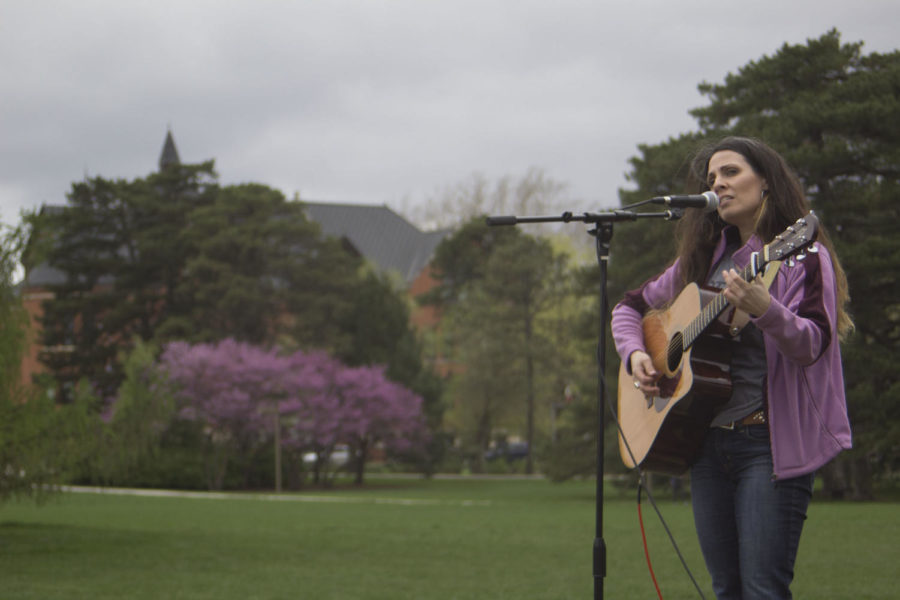Greenlee School celebrates First Amendment Rights by utilizing them
Jen Coppoc, a faculty member of the American Indian Studies Program, spoke and sang during the Feast on the First Amendment. Feast on the First Amendment was held on Central Campus on April 20 as a part of First Amendment Day.
April 20, 2017
Malik Newson, junior in journalism and mass communication, asked a crowd of students gathered on Central Campus, “What does the First Amendment mean to you?”
“Let me put that in a simpler way, do you know what the First Amendment means? If you know all five of them, raise your hand,” Newson said.
Awkward silence fell upon the crowd as some hastily sat on haystack seats, while others stepped closer to the podium. It gradually dawned on each of them them that Feast On the First had begun.
Celebrated with soap boxes, sidewalk chalking and free food, the event was organized by the Greenlee School of Journalism and Mass Communication to honor the First Amendment.
The amendment recognizes the freedoms of speech, press, religion, petition and assembly. Newson provided facts that he thought were vital for people to think about.
“This survey had been done since 1997, and it reported that 86 percent of those who responded have favor protecting speech, while 10 percent have favor limiting speech and protecting people from hearing things that offend them,” Newson said.
In the religious freedom aspects, Newson believes there should be an improvement in the current numbers.
“Fifty-nine percent believe they should be allowed to freely practice the religion they want,” Newson said. “I believe there are lots of religions out there, so I don’t know why people would want to limit that.”
Before leaving the podium, Newson left his audience with a final message that he believes all Americans should hear.
“We are united under this flag because we believe that all Americans are incongruent, not similar but congruent,” Newson said. “Not everyone knows what’s going, but we need to know that we have the First Amendment for a reason.”
Jen Coppoc, professor of American Indian Studies, approached the soap box podium with a guitar.
After a three-minute acoustic performance of “Cheers to Someday,” a song she wrote to commemorate the regrets of losing those who were once dear to us, Coppoc recounted her time at the Dakota Access pipeline protests.
“I knew better as an outsider than to insert myself and so I wasn’t going to participate in this direct action, and I didn’t know what it was because I had just arrived to camp,” Coppoc said. “I wasn’t yet oriented, so I wasn’t going to be a part of it.
“Those who did participate went to the far side of camp where there was a little body of water [that] had burial sites on it. So the group of water protectors came together to build a bridge across this body of water to get to the island, to bring elders to do the ceremony.”
However, above the protesters stood law enforcement officers with guns and rubber bullets, ready to fire upon them.
“It’s important to remember that this was happening on Thanksgiving Day,” Coppoc said. “They continued building, crossed the island and held the ceremony against the instructions and threats of law enforcements.”
As a result of the protesters’ persistence, the camp was alerted by Lakota horse riders that law enforcement officers threatened a raid upon the camp.
“And it was beginning to snow that day,” Coppoc said. “And I ran because they said your life depended on this. I ran to the dome and I stood there with native and non-native women and children. But the rest of us, especially those who have knowledge of Native American history, stood there weeping because we were remembering Wounded Knee.”
For Coppoc, the experience was eye-opening and taught her some valuable things about time and history.
The event further welcomed other speakers at the soap box, including Austen Giles, who was president of the group ISU 4 Trump.
Giles emphasized the significance of challenging one’s mind in terms of freedom of speech.
“My neighbor votes for someone else, and then I’m pissed at him? I just don’t get that,” Giles said.
Giles said voting for a candidate should not interfere with how people treat one another.
He also recounted the times that people had thrown insults, cusses and other abusive language on social media.
Giles was supposed to host a Milo Yiannopoulos event on campus that was later cancelled.
“The university didn’t want to cancel my event but they want to use mafia tactics,” Giles said. “I’m just asking you to take the time to listen to my ideas and challenge yourself.”
Michael Norton, university counsel, also took over the soap box.
He said the university respects the freedom of speech and encourages it for every individual.
He further addressed the Milo event cancellation, which was supposed to occur at a reasonable fee because the organization was not student based.
“They chose to not to pay the fee,” Norton said. “If they had paid the fee, the event will definitely had happened.”







